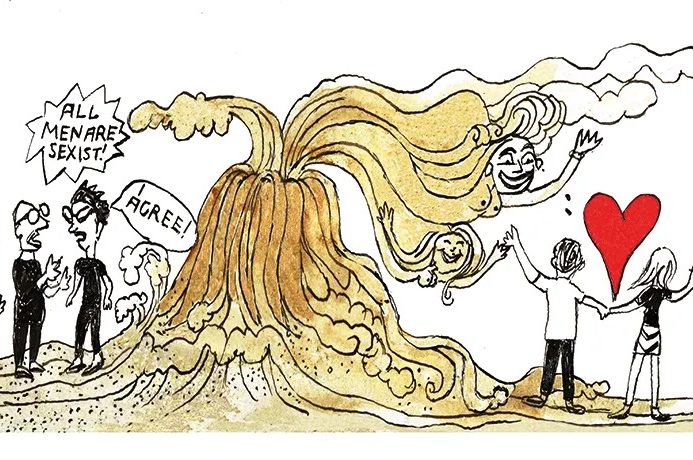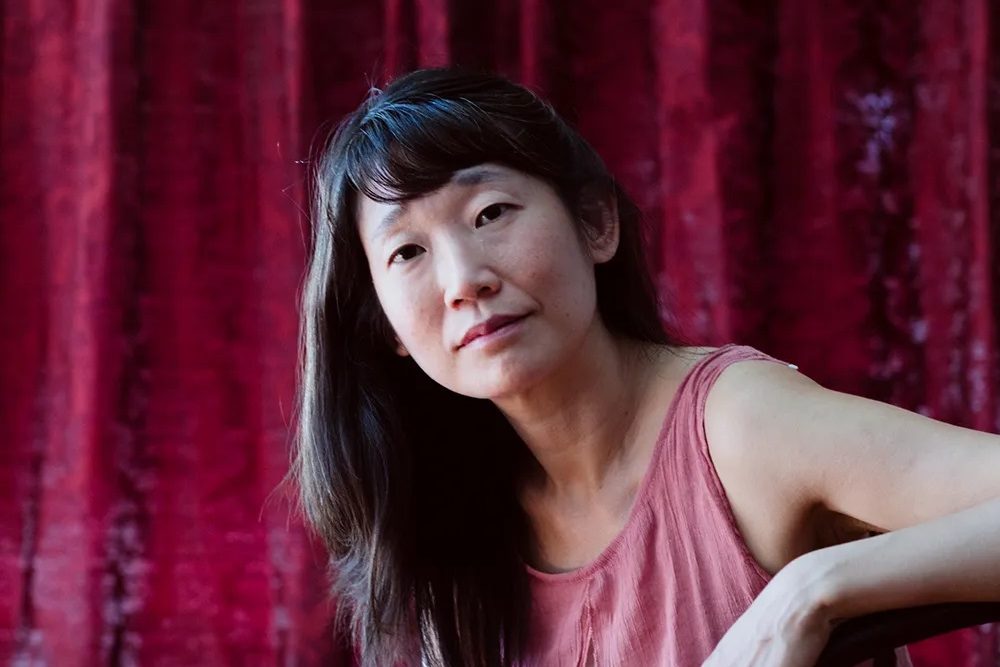I’ve run away. I’m not saying where I’ve run to because then they’d be able to find me. I’m not saying who “they” are either. So far no one has noticed I’m missing. I shuffle along with my head down, my old-geezer Woody Allen bucket hat sheltering my face, my hands shoved deep into the pockets of my shorts. Damn! The mention of “shorts” gives away that I’m somewhere hot. You have to be careful writing a clandestine piece. Fearing I’ve been spotted, I veer off the path, clamber over rocks and find myself on a black volcanic beach. It’s like walking on a fire that everyone hopes has gone out. That’s another clue. Which volcano? Anyone would think I want to be found. In fact I won’t mind if the person who finds me doesn’t have a clue what’s going on in the world. So a beach is the perfect place to be. From the promenade to the sea, beaches are news-free. Without any other care, women stand under the public showers dancing the black lava out of their bikini bottoms. This could be the last sight I will see before it all ends.
Years ago, when I was a university lecturer, I used to compete with my colleagues in imagining the silliest thing anyone would say about literature once social scientists took it over. The person who guessed that Jane Austen would be hauled over the coals for ignoring the slave trade was unanimously declared the winner. Then Edward Said, the man who made grievance an academic discipline and came up with the word “orientalism” to describe the wrong sort of interest I would be taking in indigenous people on the beach were I taking any sort of interest in anyone, hauled Jane Austen over the coals for ignoring the slave trade. This was the moment I realized the study of literature was over. My best friend became a post-colonialist and I stopped understanding a word he said.
Despite this, I plough my lonely furrow of words. I have a new novel in February, What Will Survive of Us, a title I take from Philip Larkin’s poem “An Arundel Tomb.” That’s the one in which Larkin notes with “sharp tender shock” that the earl has removed his gauntlet and has been holding the countess’s hand for centuries. The feelings defy the cold stone in which they’re expressed. It’s an elegant poem, similarly defying its own rigidity. If you can read it and not weep a stony tear, you have never held a lover’s hand. I can’t go for long without a hand in my mine. I’ve always been a love poet masquerading as a Rabelaisian novelist, it’s just that no one has noticed. In my new novel, I celebrate love from its first ecstatic minute to its final devotional hour and make fewer jokes, so they have no excuse. “They?” I’ve told you, I’m not saying who “they” are. Let’s leave it at their being people who think it’s my job to write about the slave trade.
When did the academy lose its sense of humor? Before literature started dying there was the campus novel, which no one under forty-five will have heard of. It celebrated the absurdities of academics who knew they counted for nothing in the scheme of things and were therefore heroes of existential inconsequence. The world was safe from the egos of intellectuals so long as Kingsley Amis’s Lucky Jim Dixon and David Lodge’s Philip Swallow were the most potent forces the universities could unleash on a dozy world. But just as suddenly as they appeared, these monsters of nothing worse than redbrick ambition, ineptitude and concupiscence ceded place to post-colonialists, conflict theorists, symbolic interactionists and apologists for terrorism.
I am wrong about the beach. When I look again I see it is full of intellectuals, presumably in town for an International Conference of the Vanities, sitting on rocks trying to get the black sand out from between their toes. “In sum,” I hear one saying to a small boy who keeps failing to build a sandcastle out of lava, “the resurgence of the civic-minded thinker has contributed greatly to the political re-awakening of the public sphere.” I’m lonely here, not having held a hand in days, so I interpose. “You mean as in teaching your students to applaud the rape and slaughter of women and children,” I say, unthreateningly. “That’s if it happened,” one replies. “But then, if it didn’t,” I persist, “who are those hostages whose posters you’re tearing down?” “Friend — what do you think decolonizing looks like?” another asks me. I fire a question back. “What doth it profit a man to decolonize the whole world, and lose his own soul?” If I were a poster he’d rip my face off. This is when I realize why the beach is smoldering. I have blundered into Hell.
This article was originally published in The Spectator’s UK magazines. Subscribe to the World edition here.


























Leave a Reply